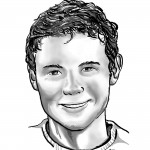Given the ascent of TV over film as our most obsessed-over and respected form of mass entertainment — a trend evidenced by a Wall Street Journal movie critic imploring us to break away from “Breaking Bad” and go see a movie — one might think that the Emmys would have surpassed the Oscars and Golden Globes as the award show of note.
Clearly, this switch has not — as of yet — taken place. Viewership for Sunday night’s show came in slightly under that of the most recent Golden Globes and below half of the most recent Oscars.
I would, however, like to single out one of Sunday night’s awards for particular prescience: “Veep”’s Julia Louis-Dreyfus was recognized for the second year running as best actress in a comedy. The award was fully deserved, solely on the basis of her performance.
Still, it’s a little remarkable to think that the same Academy of Television Arts & Sciences that in 2001 gave Martin Sheen the best actor award for his performance as President Josiah Bartlet in “The West Wing” — and gave that show the Outstanding Drama Award from 2000 through 2003 — now pays homage to Ms. Louis-Dreyfus’ totally opposite character.
Granted, “Veep” is an HBO comedy and “The West Wing” was a network drama. Still, a survey of current political television series reveals some of the most important changes America has experienced culturally and politically over the last 10 years.
Where “The West Wing” was uplifting and idealistic, with nearly every episode making some variation on the claim that the people in government — and in the White House in particular — were both incredibly smart and well-meaning, current shows make the opposite claim. The higher up the political ladder one goes, the more corrupt — and often buffoonish — our leaders are.
In the Netflix original series “House of Cards,” House Majority Whip Frances Underwood embodies an unadulterated and ultimately murderous evil. We nonetheless identify with him because the nominally more powerful House majority leader or speaker or president are all so dumb. In “Homeland,” we are at least in some sense supposed to sympathize with Sergeant Nicholas Brody’s murder of Vice President William Walden, who is both callously uncaring and totally clueless.
Indeed, the only current political show that presents a relatively positive view of those at the highest echelons of American political power — “1600 Penn” — was canceled after one season.
The idealistic ethos that worked so well for “The West Wing” in the late ’90s and early 2000s seems somehow outdated and quaint in our post-Iraq, post-Katrina world of anemic economic growth and political paralysis. It wasn’t that the political figures that “The West Wing” was responding to were anywhere as upstanding as Aaron Sorkin’s alternative versions — indeed, in many ways “The West Wing”’s Bartlet better resembles President Obama, with his picture-perfect family and often professorial style, than President Clinton with his philandering or President Bush with his common-man effect.
What’s gone, however, is the basic faith in America’s political process that enabled “The West Wing” to impose an alternative and improved (at least according to the NBC-watching demographic) cast of characters onto a basically familiar political landscape. That faith lost, TV audiences are demanding something darker and more cynical.
Which brings me back to “Veep,” and its relatively strong Emmys performance against, say, “House of Cards.” Where “House of Cards” and much of modern television responds to our loss of faith in politics by injecting evil into its highest rungs, “Veep” takes a different tack. Its characters are selfish and uninspiring — Vice President Selina Meyer responds to news that the president may be dying with a barely concealed smile (and conceals her frustration even more poorly when she learns that the president’s heart pains were actually barbecue-induced heartburn) — but they aren’t exactly criminal masterminds, or masterminds of any sort.
Instead, they’re self-obsessed and often stupid victims of events beyond their control, who nonetheless believe themselves to be at the center of the universe. In other words, they’re relatively normal people — not so different from who we see when we look in the mirror (at least on a bad day).
“Veep” captures our disaffection with the political process, but it does so brilliantly, not implicating the evil of a few actors at the top, but rather indicting very ordinary human failings. Politicians may be cynically self-interested, but they are no different from we the voters, who determine what they must say in order to get votes. Political disillusionment, then, is in no small measure our own fault.
Harry Larson is a senior in Jonathan Edwards College. His column runs on alternate Tuesdays. Contact him at harry.larson@yale.edu.








